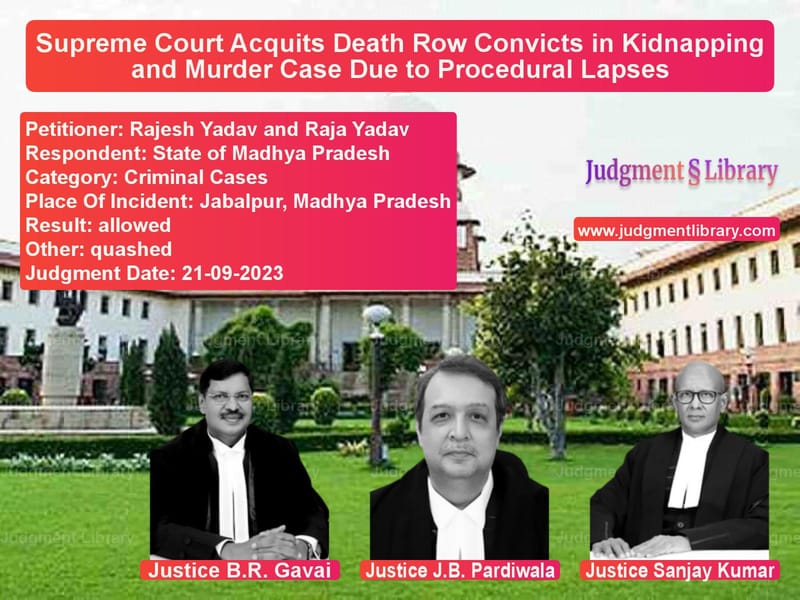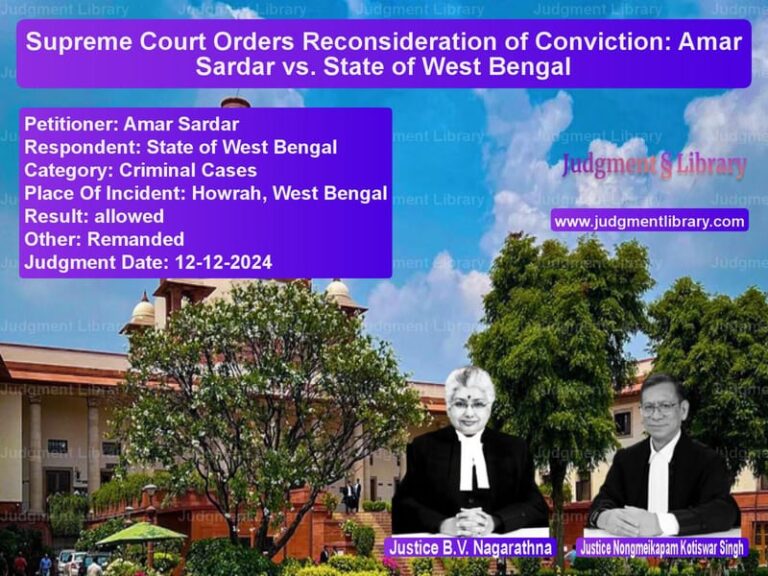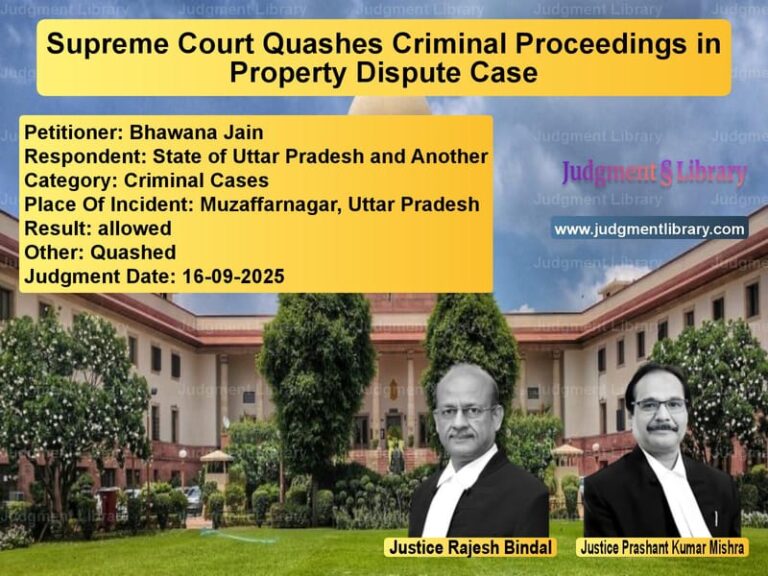Supreme Court Acquits Death Row Convicts in Kidnapping and Murder Case Due to Procedural Lapses
The Supreme Court of India has overturned the conviction and death sentences of Rajesh Yadav and Raja Yadav in a sensational case involving the kidnapping and murder of 15-year-old Ajit Pal. The Court found severe lapses in the investigation, procedural violations, and inconsistencies in the prosecution’s case, ultimately granting the accused the benefit of the doubt.
Background of the Case
The case originated in Jabalpur, Madhya Pradesh, where the victim, Ajit Pal, was allegedly kidnapped for ransom and later murdered. The prosecution claimed that the accused had knowledge of Ajit Pal’s mother’s financial transactions, leading them to plan his abduction.
The key events in the case were as follows:
- Ajit Pal was last seen on the night of March 26, 2013, leaving his home to attend the ‘Holika’ festival.
- His mother, Rajwant Kaur, lodged a missing person’s report on March 27, 2013.
- On March 28, 2013, a ransom call was made, demanding ₹50 lakh for his release.
- On March 29, 2013, the police recovered Ajit Pal’s body from a well, packed in a plastic sack, with his throat slit.
- The police arrested Rajesh Yadav, Raja Yadav, and Om Prakash Yadav based on their alleged involvement in the crime.
Charges and Conviction
The trial court found the accused guilty and sentenced them as follows:
- Rajesh Yadav and Raja Yadav: Death sentence under Sections 302 (murder) and 364A (kidnapping for ransom) IPC, along with additional imprisonment for destruction of evidence under Section 201 IPC.
- Om Prakash Yadav: Life imprisonment under Sections 364A and 120B IPC (criminal conspiracy).
The Madhya Pradesh High Court confirmed the convictions and sentences, including the death penalty for Rajesh and Raja Yadav.
Key Issues Before the Supreme Court
The Supreme Court considered the following legal questions:
- Was the prosecution able to establish an unbroken chain of circumstantial evidence?
- Did procedural lapses affect the reliability of key evidence?
- Was there any direct evidence linking the accused to the crime?
- Did the case qualify as a ‘rarest of rare’ case warranting the death penalty?
Arguments by the Appellants (Rajesh Yadav & Others)
The appellants, represented by their defense counsel, argued:
- The prosecution’s case was entirely circumstantial, with no direct evidence linking them to the murder.
- The police investigation was flawed, with significant procedural violations in the recovery of evidence.
- There were contradictions in witness testimonies, especially concerning the ransom calls and the time of Ajit Pal’s disappearance.
- The DNA evidence was unreliable due to gaps in the chain of custody.
- The trial court and High Court imposed the death penalty without meeting the legal threshold for ‘rarest of rare’ cases.
Observations of the Supreme Court
The Supreme Court bench, comprising Justices B.R. Gavai, J.B. Pardiwala, and Sanjay Kumar, meticulously analyzed the case and identified multiple flaws:
1. Lack of Clear Circumstantial Evidence
The Court reiterated that circumstantial evidence must form an unbroken chain leading to the guilt of the accused. It noted:
“The prosecution utterly failed to establish an unbroken chain of events unerringly pointing to the guilt of the appellants.”
2. Contradictions in Witness Testimonies
The Court found that key witnesses provided inconsistent statements:
- There was confusion about whether Ajit Pal left home at 9 AM or 9 PM on March 26.
- His mother, Rajwant Kaur, initially denied recognizing the ransom caller’s voice but later changed her statement.
- The ‘last seen’ witness was discredited, as the High Court found his testimony unreliable.
3. Procedural Lapses in Police Investigation
The Supreme Court was highly critical of the police investigation, stating:
“The investigating officer did not adhere to the basic principles of procedural fairness, rendering key evidence unreliable.”
Key lapses included:
- The accused were allegedly in custody before their formal arrests, raising doubts about their confessions.
- The recovery of the body and murder weapon was based on inadmissible confessions.
- The ransom call was traced to a SIM card belonging to a person named Bhuraji, yet the police never investigated him.
4. DNA Evidence Not Reliable
The Court found that the prosecution’s claim that the victim had pulled out hair from his killer was implausible:
“The physical impossibility of Ajit Pal reaching Rajesh Yadav’s head and plucking out hair, given their height differences, raises doubts about the reliability of the DNA evidence.”
5. Failure to Meet ‘Rarest of Rare’ Standard
The Supreme Court held that the case did not qualify for the death penalty:
“No valid and acceptable reasons were put forth as to why this case qualified as the ‘rarest of rare’ cases.”
Final Verdict
The Supreme Court ruled:
- The convictions and death sentences of Rajesh Yadav and Raja Yadav were set aside.
- Om Prakash Yadav’s life sentence was overturned.
- The appellants were ordered to be released immediately unless required in another case.
- Any fines paid by the accused were to be refunded within eight weeks.
Implications of the Judgment
This judgment has far-reaching implications:
- Reinforces High Standards for Circumstantial Evidence: Courts must ensure that circumstantial evidence forms an unbroken chain leading to guilt.
- Highlights Need for Proper Investigation: Police must adhere to procedural rules to avoid wrongful convictions.
- Limits Arbitrary Use of Death Penalty: The ruling reinforces the ‘rarest of rare’ standard for capital punishment.
- Protects Rights of the Accused: Ensures that procedural lapses do not result in unjust convictions.
Conclusion
The Supreme Court’s decision in Rajesh & Anr. vs. State of Madhya Pradesh serves as a crucial reminder that procedural fairness is essential in criminal trials. The ruling protects against wrongful convictions and ensures that justice is served based on evidence that meets the highest legal standards.
Petitioner Name: Rajesh Yadav and Raja Yadav.Respondent Name: State of Madhya Pradesh.Judgment By: Justice B.R. Gavai, Justice J.B. Pardiwala, Justice Sanjay Kumar.Place Of Incident: Jabalpur, Madhya Pradesh.Judgment Date: 21-09-2023.
Don’t miss out on the full details! Download the complete judgment in PDF format below and gain valuable insights instantly!
Download Judgment: rajesh-yadav-and-raj-vs-state-of-madhya-prad-supreme-court-of-india-judgment-dated-21-09-2023.pdf
Directly Download Judgment: Directly download this Judgment
See all petitions in Murder Cases
See all petitions in Custodial Deaths and Police Misconduct
See all petitions in Bail and Anticipatory Bail
See all petitions in Judgment by B R Gavai
See all petitions in Judgment by J.B. Pardiwala
See all petitions in Judgment by Sanjay Kumar
See all petitions in allowed
See all petitions in Quashed
See all petitions in supreme court of India judgments September 2023
See all petitions in 2023 judgments
See all posts in Criminal Cases Category
See all allowed petitions in Criminal Cases Category
See all Dismissed petitions in Criminal Cases Category
See all partially allowed petitions in Criminal Cases Category







